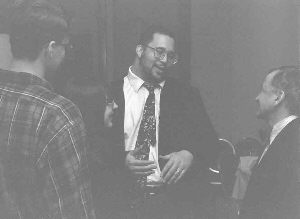A Vision for the Future: Collegiate
Debate in the Twenty-First Century
by Dr. Ede Warner, University of
Louisville
The challenges for collegiate debate as we head into the year 2000 are numerous and significant. Financial, political, and diversity issues are all areas of both concern and opportunity. Specifically, the NDT has progressed in numerous and socially meaningful ways during the first fifty years. However, we can not rest on our laurels, as many hurdles must be overcome to ensure progress continues.

The cost of participation in collegiate debate has always been an issue which directly affects the other areas mentioned above. Challenges exist both in terms of the generation of revenue, but perhaps more important, is the need to control the expense side of the equation. Debate uniquely creates a public relations irony for supporters because it generates little revenue while have a substantial cost-per-participant, especially at nationally-competitive levels. Creative responses to both sides of the equation are not just desirable, but critically necessary, if collegiate debate is to survive the "downsizing" of America, especially at public institutions. Untouchable traditions, ingrained cultural practices, and overcoming the presumption against change, must all be examined to fight the administrative battles of the twenty-first century, and combined with innovative new sources of funding and rethinking how we present the benefits of what we do, needs to uniformly occur throughout our activity.
Political battles of the year 2000 and beyond are not relegated to the halls of academia per say. Collegiate debate must not just stop at being active participants in a "game." We must be willing to take the fruits of our educational endeavors and show them to the world. Outreach educational programs, real-world utilization of the knowledge we infuse in students, and consideration of how to retain both our programs and our coaches/educators must remain a priority. Systematic efforts must be made to combat the unconscious apathy in these areas of overworked debate coaches. Long seasons, heavy travel schedules, and a demanding competitive activity sometimes forces issues like these to the back-burner. Reprioritizing and reconceptualizing our time commitments as a collective is paramount, because more time for "community service" creates inextricable linkages that can only serve us well in many aspects.
Established programs must reach back to newer ones struggling to find the delicate balance between "professors" and "debate coach." Single-director programs consistently fight for the ability to compete, against the professional demands of academia, recognizing that each is a full-time commitment, whether or not we call someone "part-time." Many programs have found solutions like "co-directors" or a professor and a debate coach, or graduate students, as productive solutions to the challenge, some have opted for disassociating debate from any university departments. Moreover, the need for re-establishing the relationship between argumentation as a communication discipline and the debate coach is urgent. Again, creative solutions are the key as some programs look to facing the challenge of preserving the relationship between communication departments and debate programs. The greater the separation between debate programs from academic departments, the greater the political isolation of debate programs.
The political possibilities of continued cooperation between NDT and CEDA should not be dismissed as just a convenience for some, or "reuniting" with some old friends. Strength in numbers is a political tool of those with savvy and both sides of these turbulent administrative waters need to recognize the win-win potential of a positive alliance. Efforts must be continued and strengthened to ensure effective, coordinated, and rational travel schedules; continued opportunities for maximum participation in both organizations; and the political participation of all programs in both organizations. The one-year "test" has overwhelmingly proven to be a success, and while naysayers are correct in noting the differences between the two groups, we have much more in common that joins us, like it or not, at the "political hip." Both organizations bring unique strengths to the alliance which must be nurtured in a cooperative learning environment without ever losing sight of the "eye on the prize," which is making a real difference in the lives of our students in terms of: active participation in a wonderful critical thinking activity, enhancing awkward pedagogical skills like research methods and rhetorical development, and striving toward teaching excellence in competitive debate.
The art of recruiting is a final challenge for the new millennium; and not just recruiting talented debaters, but attracting a diversity woefully laking in the participation levels of collegiate debate. Improving the numbers of women and people of color can not solely be measured just in terms of debate participation, although that is a starting point. We must also develop and cultivate numbers in the graduate assistant ranks, the coaching ranks, and alumni of the "long gray line" who have demonstrated a career of excellence in the activity. Collegiate debate programs coordinate a variety of activities with area high schools in cities like Detroit, Atlanta, and Birmingham and summer institutes like Iowa, Michigan, and Vermont work tirelessly to find resources to improve diversity among the high school ranks. But that must only be a starting point.
The second stage of the construction must be to find solutions to the barriers which prevent diversity from reaching the upper competitive echelon, without compromising the standards of excellence that tradition has bestowed on collegiate debate. A sincere commitment to excellence through diversity must be the long-term priority, if debate is wiling to fight the stereotypes association with providing equal opportunity. To believe that equal opportunity presently exists in competitive debate, is to ignore the socio-economic institutional factors which have stopped diversity in it's tracks.11